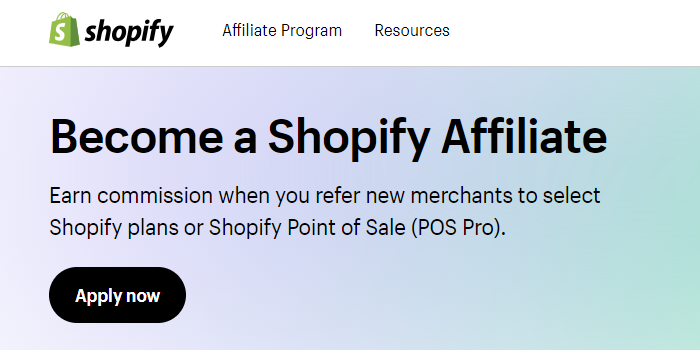January 14, 2025
Affiliate Disclosure: We may earn a commission if you buy something through the links on this page (at no extra cost).
Digital nomads everywhere discuss subjects like e-commerce software, marketplaces, and drop shipping daily. Global sales in the trillions support a desire to enter e-commerce. Similarly, affiliate marketers want to jump on the e-commerce bandwagon by promoting e-commerce software, apps, themes, plugins, and related products and services. For affiliate marketers, Shopify might be their way to riches.
Shopify is a leading cloud-based and multi-channel commerce platform for businesses of all sizes. Merchants/sellers use Shopify to create, set up, and operate their stores across multiple sales channels, including web, mobile, social media, brick-and-mortar, and pop-up shops. The platform also gives merchants a powerful back-office and a single view of their businesses. Shopify POS (point-of-sale) is an in-store application for iOS and Android devices. Shopify is engineered for reliability and scale, making enterprise-level technology available to every type of merchant.
Company Profile
- Founded by Tobias Lütke, Daniel Weinand, and Scott Lake in 2004
- Headquarters: Ottawa, Ontario, Canada
- Stock ticker: SHOP
- Five offices across North America
- 1M+ active Shopify stores
- Shopify does billions in gross product volume (GPV)
Plans and Pricing
Shopify offers multiple plans with no setup fees. In addition, a free trial is available without requiring credit card details.
| Plan | Price (Monthly Billing) |
| Starter | $5 |
| Basic | $25 |
| Shopify | $65 |
| Retail | $89 |
| Advanced | $399 |
| Shopify Plus | $2,300+ |

Shopify Affiliate Program Review
Shopify has an affiliate program on Impact, a top-rated affiliate network. Here’s a snapshot.
- Cost per action (CPA): Cost per sale
- Commission rate: Up to $150
- Commission type: Nonrecurring
- Cookie duration: 30 days
- Payout threshold: $10
- Payment options: PayPal and bank account (get free bank account details for USD, EUR, GBP, and other currencies with Wise)
- Affiliate software: Impact
Get More Views and Subscribers
Program Eligibility
Acceptance into Shopify’s affiliate program includes the following criteria:
- You own and run an active website.
- You have an established audience.
- You create original, high-quality content, such as online courses, webinars, blog posts, or videos.
- You have experience with Shopify or other e-commerce platforms.
- You read and agree to the Shopify Partner Program Agreement.
Shopify’s affiliate team will review your application and, in most cases, approve it within five business days. If your application is approved, you’ll receive an email confirming your acceptance and resources to help you get started.
How to Sign Up or Apply
Follow these steps to sign up for Shopify’s affiliate program:
- Visit the Shopify affiliate program page.
- Check the FAQs to ensure eligibility.
- Click on the apply button.
- Complete the application on Impact (you must join Impact if you don’t have an account).
- Read and agree to the terms and conditions.
- Submit your application.
Program Benefits
An affiliate signup page outlines the program and its operation, and Shopify does a good job of this. It covers everything you need to know and the resources tab links to the company’s help center or knowledge base for more information.
The program’s requirements are standard and include website ownership, an established audience, and a desire to create original content, such as tutorials, seminars, articles, or videos.
Shopify offers high commission rates. You can receive up to $150 for each referral who signs up for a paid plan, making it a highly profitable affiliate program.
The program has a 30-day cookie. Sales attribution starts when a person clicks on your link and signs up for a free trial within 30 days. You’ll earn a commission if the user becomes a customer after the trial period. Shopify’s 30-day referral period meets the industry standard.
The payout threshold is low. One conversion is all it takes to get paid, and payments are sent to your bank or PayPal account.
Impact’s affiliate software is top-notch. It offers excellent and reliable tracking solutions. Furthermore, the user interface and activity reports are user-friendly and easy to navigate.
Affiliates receive appealing and to-the-point banners and creative resources. Shopify’s marketing materials are well-designed.
Publishers can create links for tracking purposes and with unique identifiers, such as the campaign name, content, source, and medium.
There’s a full-time affiliate marketing manager. When a merchant has the staff to support publishers, it quickens processes and shows commitment. Shopify’s affiliate team is on the ball. The few emails that I sent were resolved quickly.
Shopify offers various resources and training for affiliates.
Shopify is the market leader. It’s the go-to solution for achieving your e-commerce goals and competing with Amazon. Its advantages include a reputable brand, efficient and user-friendly software, fantastic content and guides, and free online courses.
More great reads:
- 36 Best Recurring Affiliate Programs
- 25 Best Gaming Affiliate Programs
- 29 Best Financial Affiliate Programs
- 19 Best Dating Affiliate Programs
Program Drawbacks
A 30-day cookie is satisfactory, but a 45- to 90-day one would be much better. To receive credit, a person must sign up for a free trial within 30 days of clicking your link. However, store planning can take a while, so the referral period might expire before the user signs up. Therefore, a longer conversion window would benefit affiliates.
How to Promote Shopify
Here are ways to promote Shopify across different funnel stages: ToFu, MoFu, and BoFu.
🛒 Top of the Funnel (Awareness)
Blog Posts and Guides: Write introductory content like “What is Shopify and How It Works for Online Stores” or “Best E-commerce Platforms for Small Businesses,” with affiliate links to Shopify’s free trial signup page.
Social Media Content: Create engaging Instagram Reels, TikToks, and YouTube shorts about “How to Start an Online Store in 5 Easy Steps” or “Why You Should Use Shopify for Your Business,” leading viewers to Shopify with a CTA.
SEO: To attract organic traffic, target broad and long-tail keywords like “best e-commerce platforms” or “how to start an online store for baby products.”
🛍️ Middle of the Funnel (Consideration)
Email Marketing: Build a segmented list of potential entrepreneurs or small business owners. Send emails comparing Shopify to other platforms (BigCommerce, Magento, and Wix) or showcase how users benefit from Shopify’s features with links to signup offers.
Webinars and Podcasts: Host webinars or podcast episodes about starting an online business, e-commerce growth strategies, or scaling with Shopify. Throughout the content, mention Shopify’s benefits.
Comparison Articles: Write detailed posts like “Shopify vs. WooCommerce: Which Is Better for Your Business?” or “Top Shopify Alternatives for E-Commerce.”
📦 Bottom of the Funnel (Conversion)
Discount Pages and Coupons: Offer exclusive deals, discounts, or free trials for Shopify plans to encourage users to convert. A dedicated landing page that highlights these offers can help boost conversions.
Case Studies: Share case studies of entrepreneurs who launched successful businesses using Shopify. Highlight how Shopify’s features helped them grow.
Retargeting Ads: Use retargeting ads to bring back users who visited your Shopify content but didn’t sign up. The ads should feature testimonials, free trials, or exclusive offers to convert them into paying customers.
Start Earning
Can you make $1,000 a month as a Shopify affiliate? You can and more. Shopify is a market leader with an excellent brand and rewarding affiliate program. It pays high commission rates and uses efficient affiliate marketing software. Shopify supports affiliates with training guides, marketing insights, and live chat. Lastly, it offers many promotional items to lure new customers, including articles, guides, webinars, and free online courses from its academy.
Where should Shopify rank in your marketing activities? It should be a mid- to high-priority. E-commerce is one of the best ways to make money online, and many people seek store software and apps to start selling online.
I recommend joining Shopify’s affiliate program because it pays high commission rates, and I’ve made money.
